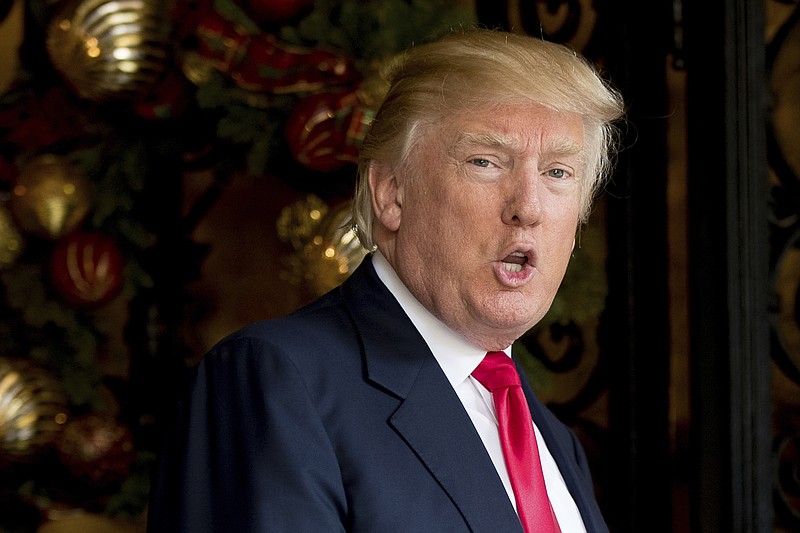What we will know of the Trump administration and what we won't know may be destined to pivot on how well we learn to watch the carnival barker's shell game.
Nicholas Kristof of The New York Times wrote Sunday about the failings of the media in the past year's elections:
Take, for instance, issues reporting - as defined by independent coverage of issues such as poverty, race, climate change, drug addiction, the economy. Not coverage of candidate statements (His hands are small/No they're not) or debates.
In 2008, the three broadcast networks, in nightly news programs, devoted over that year a total of three hours and 40 minutes to issues reporting. In 2016, the total was 36 minutes. A deeper dive, according to Andrew Tyndall, whose Tyndall Report monitors news programs, shows ABC and NBC had nine minutes of issues coverage each; CBS had 18 minutes. Putting that in perspective over the year, ABC and NBC each had less than one minute of issues coverage per month in 2016.
"Everyone knew that Trump was ratings gold, while a segment on poverty was ratings mud," Kristof writes.
And Tyndall noted that reporting "news" based on ratings is like treating viewers "not as citizens, but as so many pairs of eyeballs."
That's only partly fair. And only partly true. TV news and newspapers must pay the electric bill just like everybody else, and ratings help determine advertising rates, so yes, eyeballs get counted.
So what does it say of us - the viewers, listeners and readers - that our eyeballs are glued not to stories of poverty and policy, but to stuff that doesn't matter - the stuff that makes Trump ratings gold?
It says, tragically, that we don't want to be smart, informed or educated. We'd rather be entertained. How else can you read a ratings number that shows we won't watch a program about poverty, climate and those other generally dense "issues" subjects that are in fact the very reason that government exists to be of service to us?
Trump and his circus troop of Breitbarters understand this. And they also understand bright-shiny-object manipulation. They employ this technique all too well - both to distract the media and to distract the public.
They and some GOP House chumps appear to have employed this bait-and-switch even Monday evening and Tuesday morning after a long holiday weekend that had included increased coverage of our hacked election and Trump's wariness of the subject. The long weekend also was one that starred Obama's sanctions against Russia and headlines like "Trump Revives Defense of Charitable Foundation Amid Inquiry" and "Video Puts New Focus on Donald Trump's ties to Dubai Partner."
Suddenly on Monday night, the public was greeted with the surprise news that House Republicans, meeting in a secret session, voted, over the objections of Speaker Paul D. Ryan, to eliminate the independent ethics office. That office was created in 2008 in the aftermath of a series of scandals involving House lawmakers, including three who were sent to jail.
Then on Tuesday morning, Democrats were dutifully squawking, and Trump got to act like the cavalry - trotting out a tweet that he certainly knew would detract further from the hacking and conflict questions.
"[D]o they [House members] really have to make the weakening of the Independent Ethics Watchdog, as unfair as it may be, their number one act and priority[?]," he wrote.
Mind you, with the phrase, "unfair as it may be," he didn't seem to be indicating any great displeasure with the idea of weakening that watchdog ethics group. Rather, he swatted at the timing. After all, it seemed to kick sand in the eyes of voters who expect him to "DTS." That's the new tweet-sized version of "Drain the swamp."
Within a matter of hours, the House Republican Conference moved to reverse the plan to kill the Office of Congressional Ethics. Some media pundits began to gush and credit Trump. Never mind that chorus of protests from GOP leadership, Democrats and even the media itself.
But the bright, shiny objects did the trick. The whole day's news coverage tilted to the glitter of a new story.
David Axelrod, a former adviser to President Barack Obama, got it right on the money - via Twitter, of course: "This House ethics drama was an absolute gift to [Trump] - a big, fat zeppelin for him to shoot down. Which he did."
Yes, the media is a pawn. But, you, gentle readers, are, too.
Once again, let us implore of you: Follow - and demand that the media follow - the issues.
Trump tweets credit for saving a few hundred jobs here, another few hundred there. Between early 2010 and the fall of 2016, the Obama administration created 15 million jobs - that's about 2.5 million a year, or 208,333 a month.
Follow the issues, not the stage act.
Because the greatest threat to our freedom is ignorance - willful or otherwise.
